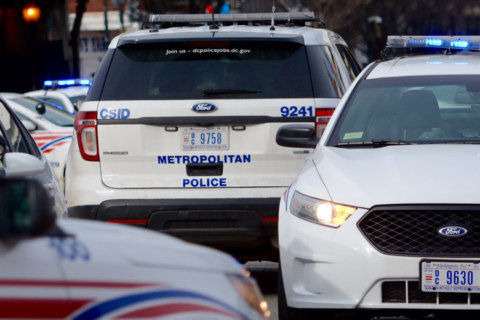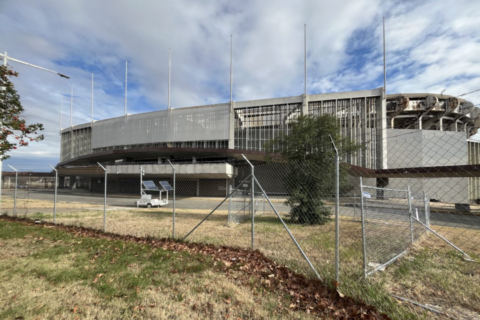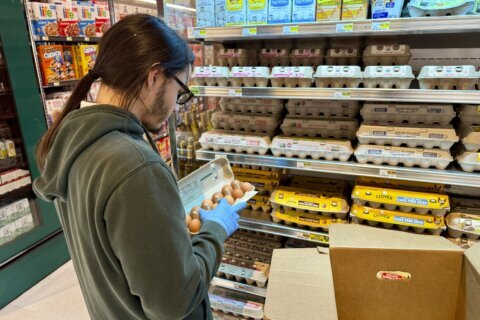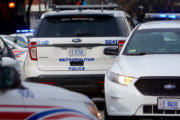D.C. Mayor Muriel Bowser is seeking a third term in this year’s race for the executive office. Primary day is just around the corner: June 21.
- Meet the candidates for DC mayor: Muriel Bowser
- Meet the candidates for DC mayor: James Butler
- Meet the candidates for DC mayor: Rodney ‘Red’ Grant
- Meet the candidates for DC mayor: Robert White
- Meet the candidates for DC mayor: Stacia Hall
- DC primary voter guide
- Local Politics and Elections News
- More DC News
She’s facing challenges from fellow Democrats James Butler, Trayon White (who did not respond to WTOP’s requests for an interview) and Robert White. November’s Republican challenger is Stacia R. Hall.
Bowser spoke with WTOP’s Mike Murillo about the hot topics in this year’s race.
Editor’s note: This interview has been edited for clarity.
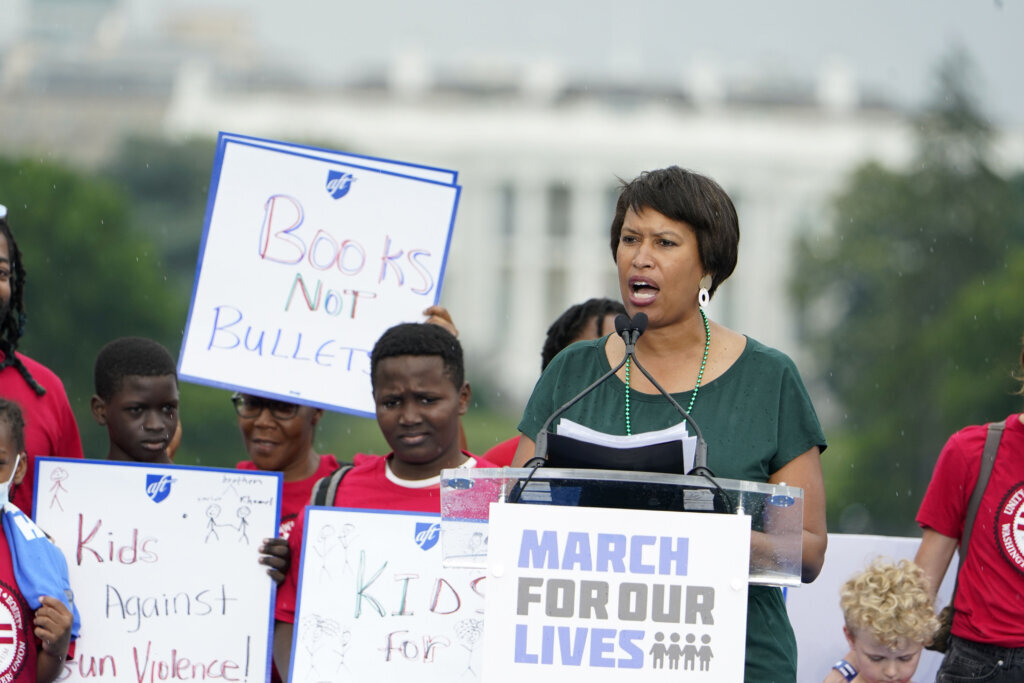
Bowser’s plans to combat crime.
Certainly we know, public safety is top of mind for D.C. residents. And it’s certainly top of mind for me. It’s the thing I think about first in the morning and last when I go to bed at night. And we know what we’ve seen nationally as it relates to gun crime and violent crime. Just yesterday, I was on the Hill, with (House) Speaker (Nancy) Pelosi and others talking about what we need to do as a nation to have sensible gun reforms that will keep our community safe.
Part of what we are focused on in the District is a framework that identifies people who have used guns and are likely to use guns and make sure that they have the appropriate attention from all our human services agencies, but also our law enforcement agencies. We believe that addressing a small group of people that are using guns in our city will help drive down crime.
But D.C. residents have also told me that they appreciate that I’m the only candidate speaking out, especially among the council members who are running for mayor, who’s willing to make the tough calls on public safety and has a comprehensive plan. That includes making sure we have enough police officers to serve our needs.
Plans for the D.C. police department.
Chief (Robert) Contee is very focused, of course, on hiring the best of the best, starting with D.C. residents — that’s why we restarted the MPD Cadet Academy. He’s made a pledge to have our force be 30% female by 2030. We’re already ahead of the national average, but hiring women, we know, is good for our department.
The last thing I want to mention is his partnership with the Violent Crime Reduction Unit and the Homicide Reduction Unit that partners MPD with our federal partners at the FBI and ATF and DEA. And recently we were together at 7th and O streets Northwest, where the United States attorney, with the FBI, joined me to talk about their yearlong investigation that resulted in 22 arrests. These were high-level people involved in drug and gun distribution. It’s that type of detailed detective work that would not only help make the 7th and O community safer, but all the way up to Columbia Heights and all the way over to Truxton Circle.
Neighborhoods were implicated in this very, very big investigation. That type of work, it’s hard work and requires good people. That’s why we need our force strength at levels that support not only patrol but detective work.
Whether more police officers should be part of the solution.
[T]hose council members defunded the police for two straight years, [and] we were unable to hire anybody. We saw our force strength go down 200 officers. If they’d had their way, they would let it go down under 3,000, which is what their police commission report suggested. That’s not acceptable. We cannot have our response times tick up 90 seconds every year. Because if you had to call 9-1-1, I’m sure you would want to know that a police officer could respond in a reasonable amount of time to render aid.
As your mayor, that’s my job — it’s to look at the resources available and tell the council what we need and make sure we implement those resources effectively. What I’ve had to do, and what the chief has had to do, is use overtime to make sure we have the officers that we need. And that is not a sustainable solution.
Efforts to reduce traffic fatalities.
We’ve lost too many children, too many people, on our streets because of aggressive driving, people speeding and people not following the law. A 9-year-old was leaving his school, crossing a street. And he died. I was on the scene that day and that afternoon, and I was even more committed that afternoon to making sure we’re doing everything that we can to stop speeding and aggressive and distracted drivers. We also had a speeding driver hit a group of girls in Fairfax, Virginia. So we know that we are seeing, across the country, increases in traffic fatalities.
If there was a bright spot during COVID, it’s that we got a lot of construction done, and a lot of planned traffic improvements, busways, bicycle facilities, delivered across the District of Columbia and all eight wards. The council just approved my budget proposal that includes $200 million to allow us over the six-year capital improvement plan to address all of our dangerous intersections and corridors. And that is going to be just powerful work.
I was reminded recently on Bike to Work Day — which I’ve participated in for over 20 years — we were able to ride on a portion of the Metropolitan Branch Trail, starting at Fort Totten, where it’s paved. We went all the way through mid-city, came across K Street to the newly renovated Franklin Park. All of those things I promised in my inaugural address in 2015, that we would complete the Metropolitan Branch Trail — I was so proud to be on a pretty significant portion that goes through Fort Totten and connects to the mid-city.
Where Bowser stands on speed cameras moving.
Speed cameras are put in place to save lives. No one can dispute — it’s not controversial — that people survive traffic collisions at lower levels of speed. The more speed, the more likelihood of fatality. So we know that reducing speeds in our city saves lives. That’s what our camera program is for — to identify dangerous corridors and intersections where people aren’t following the law and enforce it consistently.
Bowser on economic recovery from the pandemic.
I think that this is what this election is about — who’s going to lead us through the pandemic and who do you trust to do it.
D.C. residents tell me every single day that they are grateful for my leadership. They’re pleased that we had strong and steady leadership throughout the pandemic, that we got testing up, had free tests at fire stations and libraries, that people had access to vaccines and we got our schools open safely before anybody else in the region. They know that it’s that type of steady, tested leadership that is important as we come back.
So we do have to be concerned that we are investing in a robust and fair recovery, that the people who suffered the most — hospitality, hospitality workers, restaurants, hotels, are top of mind during our comeback. Also that we are regaining where we left off before the pandemic and getting people jobs.
We recorded the lowest levels of unemployment since those numbers have been recorded in Wards 7 and 8, prior to the start of the pandemic. So our focus has been on training D.C. residents for high-demand jobs that pay well, that will allow folks to buy homes and raise their families right here in the District of Columbia. Like our infrastructure jobs — we will have the opportunity during our comeback to deploy $3 billion in infrastructure — money from the federal government. We’ve started planning: We have a task force led by former Secretary of Transportation Rodney Slater, and we are now collecting ideas about how to deploy it, but central to that is employing D.C. residents.
Let me finally say how we focus on our downtown and commercial corridors, bringing employees back. And we’ve had intense conversations with the federal government about our federal workers, but also looking to change some buildings in downtown, or on major corridors like Wisconsin Avenue and Friendship Heights, so that those buildings that may no longer be useful for office workers could become housing or some other mixed use. And we’re also focused on making sure people are enjoying our city with festivals and parades, and coming to the city for conventions, and the government itself is going to be a more active partner in bringing people to our corridors.
Affordable housing in D.C.
I’m proud of our work. I dare say it would be hard to find a more robust investment in affordable housing in any city in America, and maybe even in any state in America. We have committed a $1 billion in the last seven years, and the council just approved my biggest proposal to date of $400 million — well, I proposed 500; they approved almost all of it — so that we can build more units. I’m also proud that, unlike any other jurisdiction, we have neighborhood by neighborhood planning goals. So we’ve looked very closely at the District and know how many units that we can invest in to provide more affordable housing.
Today, we celebrated our Black Homeowners Fund. And I empaneled a strike force of industry experts, government experts and community folks to identify some strategies that address generational systemic discriminatory practices in housing that occur here in the District, some federal, some local, that kept Black Washingtonians from being able to buy homes, or use all the tools that were available to their neighbors. So this is one effort that we are looking forward to deploying, and setting a goal for increasing Black homeownership in our city.
Priorities for federal infrastructure funding.
Union Station is probably our biggest single priority, and we are very focused on that transformation. Working with Amtrak, working with (the U.S. Department of Transportation), working with a private development partner as well, to bring it back to life in some ways. We have a beautiful, historic building, but we can expand the capacity so Amtrak can add services and all the regional providers can have better use of their space as well. That’s a big priority.
DC Water is going to use some of that investment and they’ve set a goal to replace all lead service pipes by 2030. So that’s a very exciting thing to be able to say. But a focus of those dollars is also addressing historic infrastructure that separated communities. I am hopeful that the task force that we empaneled will also come back with some ideas about connecting communities that have been separated by highways. We have some good candidates that are around (Interstate) 295. And I recently met with a group of voters along the Anacostia that I’m asking to develop an idea because they too have been affected by the highway. I think that some infrastructure investments in that historic asset in the District will go a long way.
Relationship with the D.C. Council.
Well, the city council just approved my $19.5 billion budget, so I say we work pretty well on the priorities of our administration, and their priorities, and delivering them for the District of Columbia. Listen, in D.C. there are 14 people that basically decide what the city’s priorities are, fund those priorities, and implement those priorities. My job, as mayor, is to help the council members on the things that are important to them, that they fund it, and that will help the most people in the District of Columbia. And so I work hard every day to do exactly that.
On bringing the Commanders to D.C.
Everybody knows where I stand on it. I’ve said the same thing for seven years. There’s two questions here. What do we do with our land at RFK? Our pitch to the federal government has been, the District needs to control it. We shouldn’t have a falling-down stadium surrounded by asphalt when our city needs housing and jobs. So we have to get control of our land. I support, like I have supported Audi Field, if you would remember that the District acquired the land and prepared it for development. And the team, D.C. United, built its own stadium, and I think the same model would work for our football team.
What separates Bowser from her challengers.
Well, let me just say, and I hope that you’ve seen in our campaign that we can talk about my record, I have a long record of working on the big issues that D.C. residents sent me to [work on], and I’ve done the things that I promised that I would do. I promised that I would focus on affordable housing, and I did — over a billion dollars already invested. I promised that I would close D.C. General and make homelessness rare, brief and nonrecurring, and we work on that every single day. We’ve effectively ended family homelessness in the District of Columbia — it’s been reduced by 78%. We also built short-term family housing in every ward that didn’t have it: seven wards, seven projects, dignified short-term family housing. We’re proud of that as well.
I have also stood very strong on our school investments. And I believe strongly, and my opponents don’t, that we should stick with the course that’s gotten us improvement over the last 15 years. So I’m very strong on making sure that, as your mayor, I’m accountable for oversight of our public schools with the council’s oversight, and so I would not turn back the clock on our school governance model. And more than that, I will keep my promises, as I have done, on middle schools. We have 3,000 more middle schoolers than we did when we started. We built Banneker Academic High School. And we’re going to keep that going by focusing on our high school redesigns across the city.
But finally, I have been willing to make tough calls. And I am a straight talker. I won’t tell you one thing, and go into a private room and have a shifting opinion or view about a proposal. And that’s why D.C. residents know I’ll make the tough calls, whether it’s saying that we need more police because we need more police, or focusing on a strategy in a city like ours where there is housing, and there is shelter, and offering it to our residents who are unhoused and living in tents. We have to do that. And we have to make sure that tent encampments are a thing of the past in our city. That separates me. I have a real record. I’ve delivered in all eight wards. I talk straight; I’m not going to have a shifting view, a flip-flop on important issues; you can trust what I say. And I have the skills and expertise to lead the District’s comeback. And for us, that’s what this is all about.


